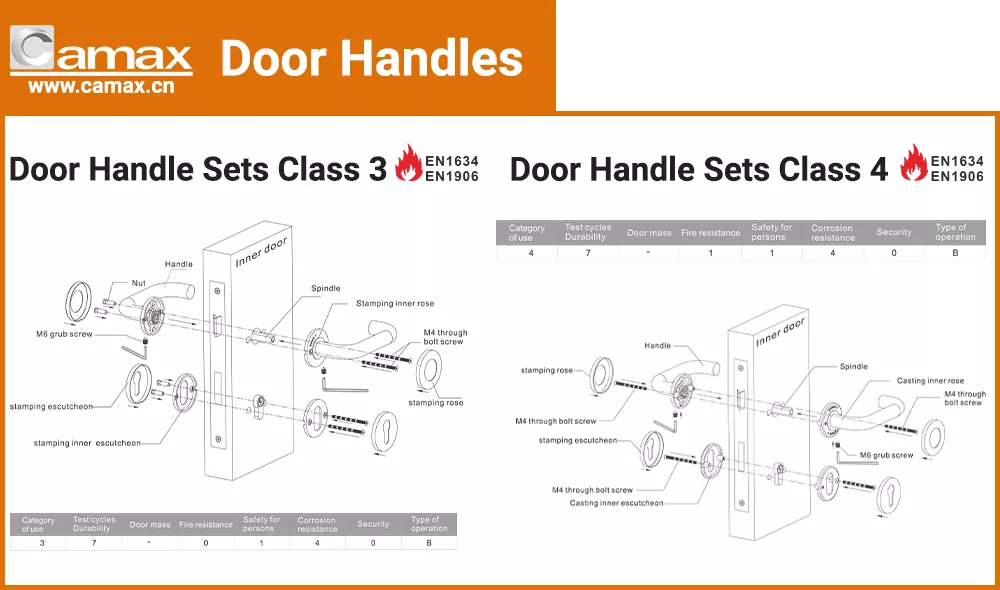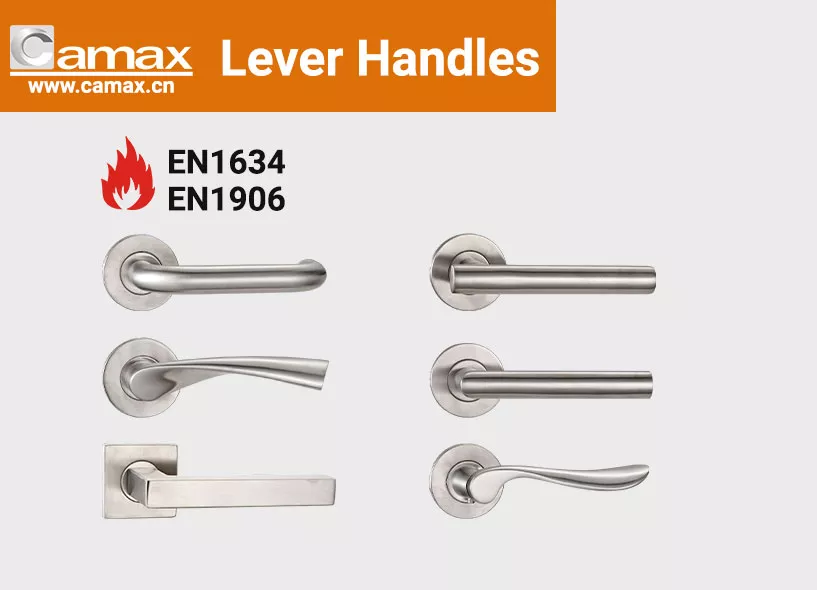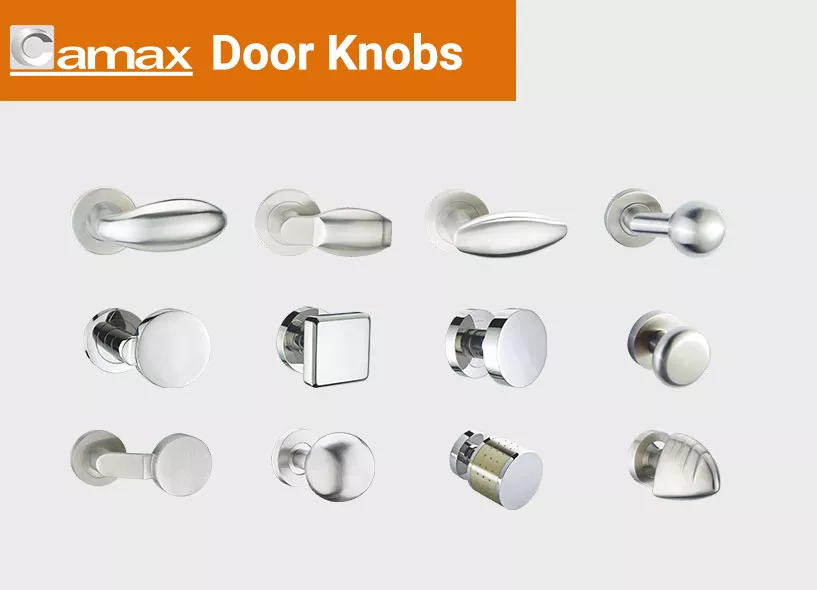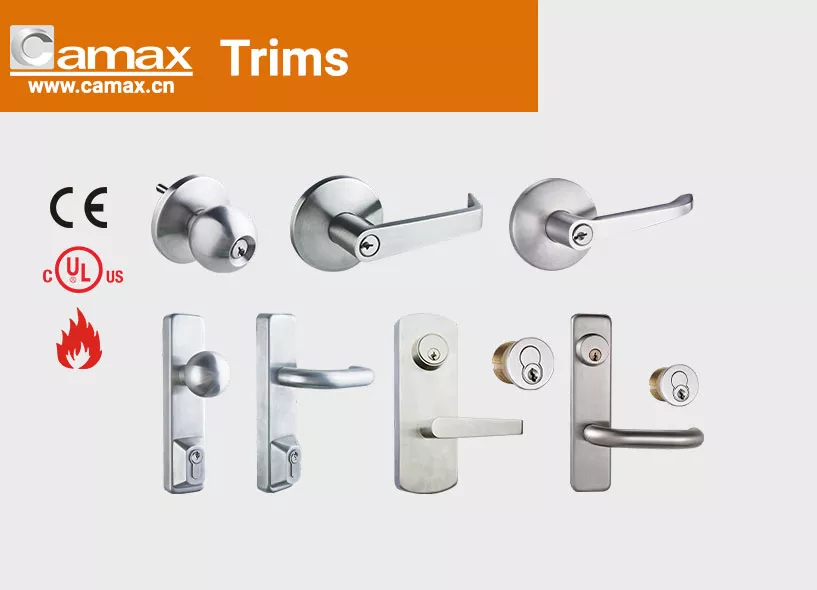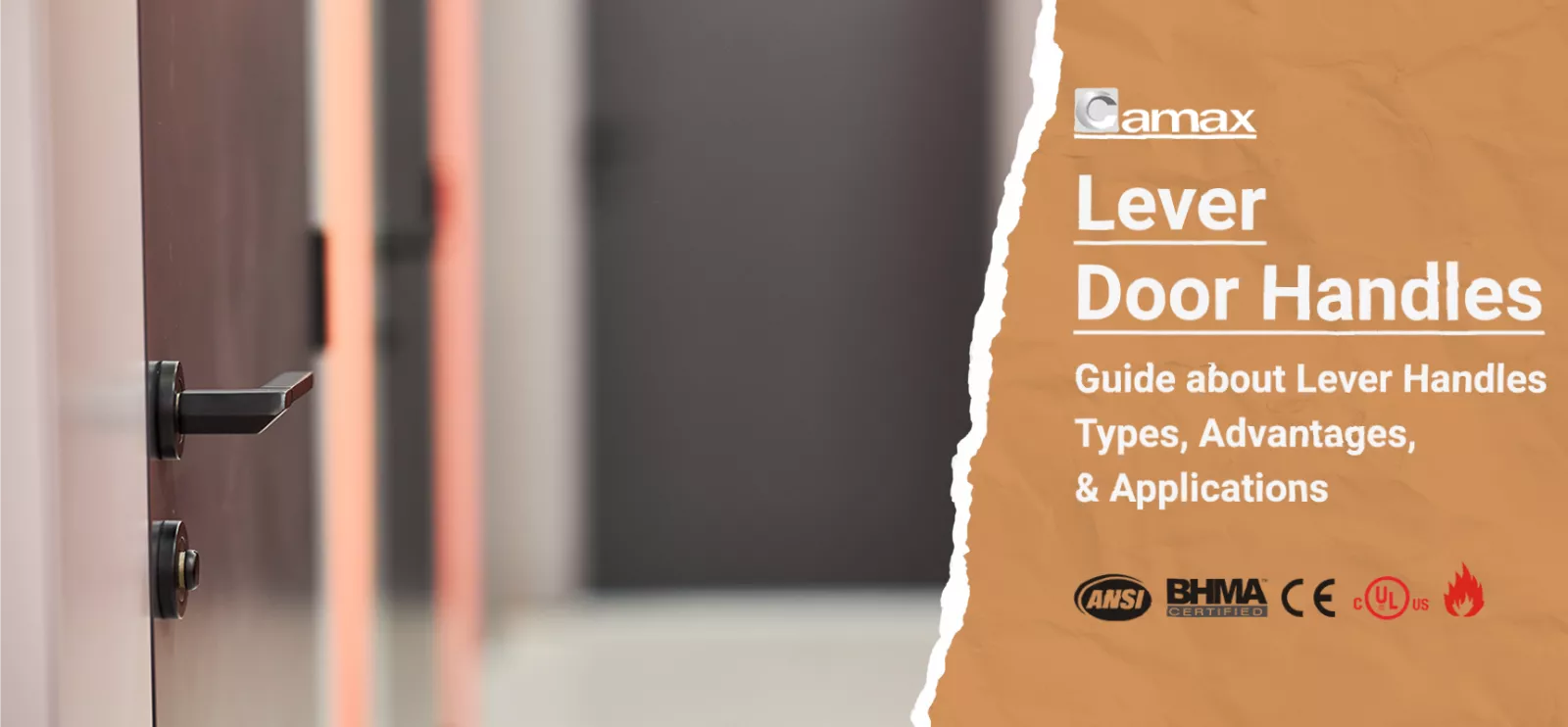
When it comes to choosing the right hardware for your doors, lever door handles have become the gold standard for both functionality and accessibility. Whether you're outfitting a commercial building, upgrading your home, or ensuring ADA compliance, understanding the different types and applications of lever handles is crucial for making informed decisions.
In this comprehensive guide, we'll explore everything you need to know about door handle with lever mechanisms, from basic functionality to specialized commercial applications. You'll discover why these ergonomic solutions have revolutionized door hardware and how to choose the perfect lever door handles for your specific needs.
Table of contents
What Are Lever Door Handles?
A lever door handle, often referred to as a lever handle or door handle with lever, is a type of door hardware that uses a horizontal bar or lever to operate the latch mechanism. Unlike traditional round knobs, a lever door handle allows you to open the door by simply pushing down on the lever, making it easier to use with minimal grip strength. This design has become increasingly popular in both residential and commercial environments due to its ergonomic benefits and modern aesthetic.
As a commercial door handle supplier, Camax Hardware specializes in high-quality lever door handles that combine functionality with durability, ensuring they meet the needs of any project.
1. How Does A Lever Door Handle Work?
The mechanism behind a door handle with lever is elegantly simple yet highly effective. When you press down on the lever, it rotates around a central pivot point, which in turn retracts the latch mechanism inside the door. This retraction allows the door to swing freely on its hinges.
The internal components typically include a spring-loaded latch, a spindle that connects both sides of the handle, and the lever mechanism itself. High-quality lever doorknob assemblies also feature return springs that automatically bring the lever back to its horizontal position after use, ensuring consistent operation over thousands of cycles.
💡 Why Are Lever Door Handles Better for Accessibility?
Lever door handles represent a significant advancement in universal design. Unlike round knobs that require a twisting motion and firm grip, levers can be operated with a simple downward pressure using an elbow, forearm, or even a closed fist. This makes them invaluable for people with arthritis, limited hand mobility, or temporary injuries.
The Americans with Disabilities Act (ADA) specifically recognizes the superior accessibility of lever handles, requiring their use in many commercial applications. For elderly users, individuals using mobility aids, or anyone carrying items, lever handles provide effortless operation that traditional knobs simply cannot match.
What Are The Types of Lever Door Handles?
Understanding the various door lever types available helps ensure you select the right hardware for your specific application. Each type serves different purposes and offers unique advantages depending on the environment and usage requirements.
1. Commercial-Grade Lever Door Handles
In commercial spaces such as offices, hospitals, schools, and retail establishments, doors experience exponentially more use than residential applications. A typical office door might be opened hundreds of times per day, while a hospital door could see even more traffic. This intensive use necessitates heavy-duty commercial lever handles that can maintain smooth operation and structural integrity over extended periods.
For commercial applications, it's strongly recommended to use lever door handles certified to EN1906 Class 4 and EN1906 Class 3 standards, which can withstand 200,000 test cycles. Class 4 certification is suitable for high-frequency use areas like main entrances and busy corridors, while Class 3 certification works well for moderate-use applications such as office doors and conference rooms.
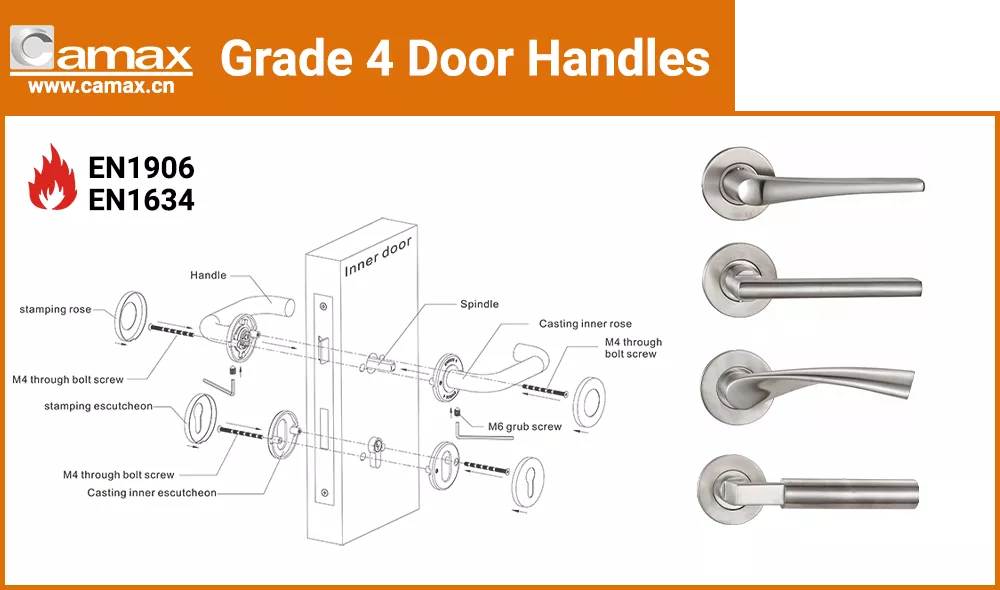
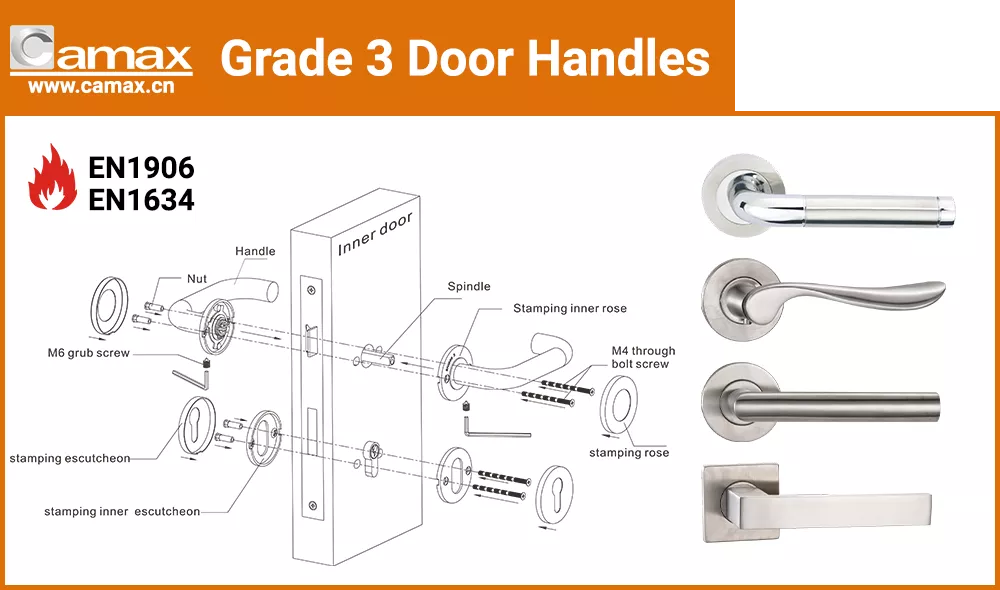
Fire-rated doors present special considerations that cannot be overlooked. For these critical safety applications, lever door handles should be certified to EN1634 standards. This certification ensures that the hardware maintains its integrity during fire conditions, allowing for safe egress while preventing the spread of flames and smoke.
Common Use
- • In commercial spaces such as offices, hospitals, schools, and retail establishments.
- • Exceptional durability and longevity.
- • Consistent performance under heavy use.
- • Enhanced security features.
- • ADA compliance for accessibility.
- • Wide range of finishes and styles.
Cons
- • Higher initial investment cost.
- • May require professional installation.
- • Limited decorative options compared to residential models.
2. Lever Handles for Narrow Stile Doors
Narrow stile doors, commonly found in aluminum storefront systems and modern architectural applications, require specialized hardware due to their limited frame width. Standard lever door handles may not fit properly or may compromise the door's structural integrity.
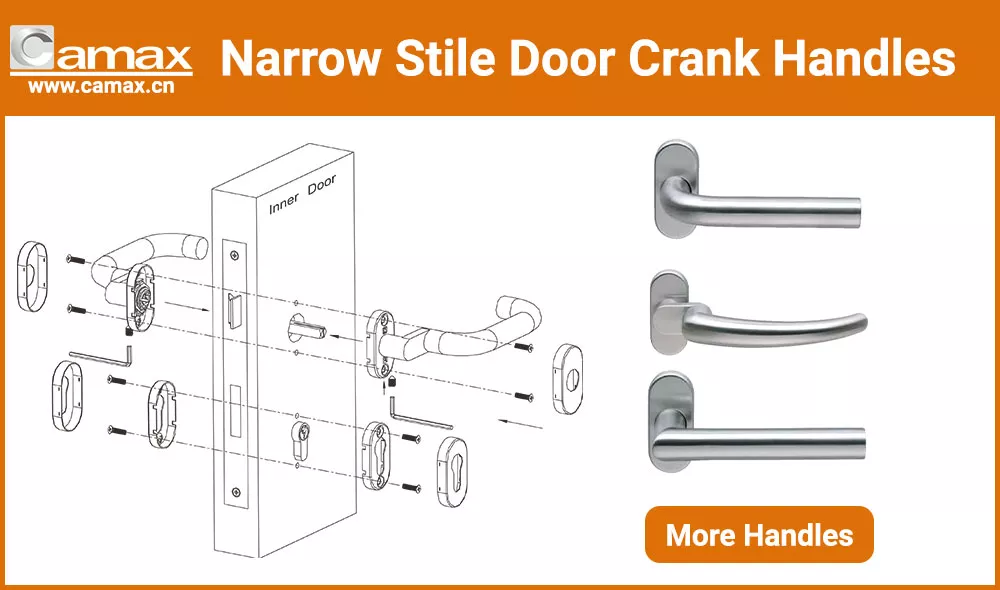
Lever handles designed for narrow stile doors should be used when working with aluminum storefronts, curtain wall systems, or any door where the stile (vertical frame member) is too narrow to accommodate standard hardware. These specialized door handle with lever systems are engineered to distribute stress properly while maintaining full functionality.
Common Use
- • In aluminum storefront systems and modern architectural applications.
- • Perfect fit for aluminum storefronts.
- • Maintains door structural integrity.
- • Sleek, modern appearance.
- • Reliable operation despite size constraints.
- • Available in commercial-grade options.
Cons
- • Higher cost due to specialized design.
- • May require specific installation expertise.
- • Potentially limited availability.
- • Replacement parts may be harder to source.
Materials and Finishes
Choosing the right material and finish for a lever handle is essential for both durability and aesthetics.
Camax Hardware offers lever handles crafted from a range of durable materials, including stainless steel, steel, and zinc alloy, ensuring long-lasting performance. To suit different aesthetic preferences and functional needs, they come in a variety of finishes, such as polished chrome, satin nickel, matte black, antique brass, and PVD coatings. These options provide both style and durability, making them ideal for residential, commercial, and public spaces.
1. Common Materials for Lever Door Handles
Stainless Steel: Highly durable and corrosion-resistant, making it ideal for commercial and exterior doors.
Brass: Offers a classic look and is resistant to tarnishing.
Bronze: Has an antique appearance and develops a patina over time.
Zinc Alloy: A cost-effective material commonly used in residential handles.
2. Popular Finishes Options for Lever Door Handles
Polished Chrome: Sleek and modern with a reflective surface.
Satin Nickel: A soft, matte finish that resists fingerprints.
Antique Brass: A warm, vintage look suitable for traditional homes.
Matte Black: A bold and stylish option for contemporary interiors.
PVD Coating: Provides enhanced durability and scratch resistance.
Applications of Lever Door Handles
Lever door handles manufactured by Camax Hardware are used in a variety of settings, from homes to commercial buildings and public spaces.
Residential Use: Interior and exterior doors in homes and apartments.
Commercial Use: Offices, hotels, and hospitals, where accessibility and durability are key considerations.
Public Spaces: Schools, government buildings, and shopping malls, where compliance with accessibility standards is essential.
Accessibility Needs: Lever handles designed specifically for people with disabilities, ensuring inclusivity and ease of use.

Frequently Asked Questions about Lever Door Handles
1. What’s the difference between a lever handle and a doorknob?
A lever handle uses a lever mechanism to operate the latch or lock, while a doorknob requires a twisting motion. Lever handles are generally more accessible and easier to use.
2. Are lever handles better for accessibility?
Yes, lever handles are designed to be more accessible, especially for individuals with limited hand strength or mobility. They comply with accessibility standards like the ADA.
3. Can I replace a doorknob with a lever handle?
In most cases, yes. Lever handles can often be installed using the same door prep as a doorknob, making the replacement process straightforward.
4. Do keypad door levers require professional installation?
While some keypad door levers can be installed by homeowners, professional installation is recommended to ensure proper functionality and security.
Contact Camax to Choose the Right Lever Door Handles for Your Needs
Selecting the appropriate lever door handle involves careful consideration of your specific requirements, including usage frequency, aesthetic preferences, security needs, and accessibility requirements. Commercial applications demand robust, certified hardware that can withstand intensive use while maintaining security and compliance with accessibility standards.
For residential applications, lever handles offer superior ergonomics and universal accessibility compared to traditional knobs. The investment in quality door lever types pays dividends in improved functionality, reduced maintenance, and enhanced user satisfaction.
If you're ready to upgrade your doors with top-quality lever door handles, don't hesitate to reach out to Camax. Our experts can provide detailed information on our range of products, including custom solutions and special quotes tailored to your needs. Contact Camax today and let's make your space more functional and inviting!
Need help? Contact Camax for a quote!
Discover Camax's door & window hardware with ANSI/BHMA/UL/CE certification today!


